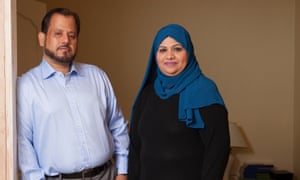
Just before Christmas seven years ago, Riffat and Sajjad were at home when the phone rang. It was the foster agency letting them know that three children they’d never met would be arriving shortly. The children – two sisters and a brother – were in urgent need of short-term care. Sajjad and Riffat had been approved as foster carers only two months earlier and these would be their first placements.
“We were excited, but I was also a bit nervous,” recalls Sajjad, 50. The couple had tried to start a family after they married, but fertility problems led to six failed cycles of IVF. They considered adopting, but eventually decided to sign up as foster carers.
Both are observant Muslims of Pakistani heritage. Riffat, 46, was wearing a headscarf when we met, and prays five times a day. How did they cope with the arrival of three white English children raised in a Christian household?
“I will never forget that day,” recalls Riffat, who grew up in Pakistan and moved to Britain after marrying in 1997. “It really was like being thrown in the deep end.” They bought chicken and chips from the local takeaway for the children and the support worker told the couple about the children’s bedtime routine.
Once the children were asleep, Sajjad headed out on an urgent shopping mission. “We are Muslims and we’d never had a Christmas tree in our home,” says Riffat. “But these children were Christian and we wanted them to feel connected to their culture.” So he bought a Christmas tree, decorations and presents. The couple worked until the early hours putting the tree up and wrapping presents. The first thing the children saw the next morning was the tree.
“I had never seen that kind of extra happiness and excitement on a child’s face,” remembers Riffat. The children were meant to stay for two weeks – seven years later two of the three siblings are still living with them.
Riffat has grown used to surprised looks from strangers and people asking if the reason she has such fair-skinned children is because she married a white man. But she focuses on the positives – in particular how fostering has given her and Sajjad an insight into a world that had been so unfamiliar. “We have learned so much about English culture and religion,” Sajjad says. Riffat would read Bible stories to the children at night and took the girls to church on Sundays. “When I read about Christianity, I don’t think there is much difference,” she says. “It all comes from God.”
The girls, 15 and 12, have also introduced Riffat and Sajjad to the world of after-school ballet, theatre classes and going to pop concerts. “I wouldn’t see many Asian parents at those places,” she says. “But I now tell my extended family you should involve your children in these activities because it is good for their confidence.” Having the girls in her life has also made Riffat reflect on her own childhood. “I had never spent even an hour outside my home without my siblings or parents until my wedding day,” she says.
Just as Riffat and Sajjad have learned about Christianity, the girls have come to look forward to Eid and the traditions of henna. “I’ve taught them how to make potato curry, pakoras and samosas,” Riffat says. “But their spice levels are not quite the same as ours yet.” The girls can also sing Bollywood songs and speak Urdu.
“I now look forward to going home. I have two girls and my wife waiting,” says Sajjad. “It’s been such a blessing for me,” adds Riffat. “It fulfilled the maternal gap.”
No comments:
Post a Comment